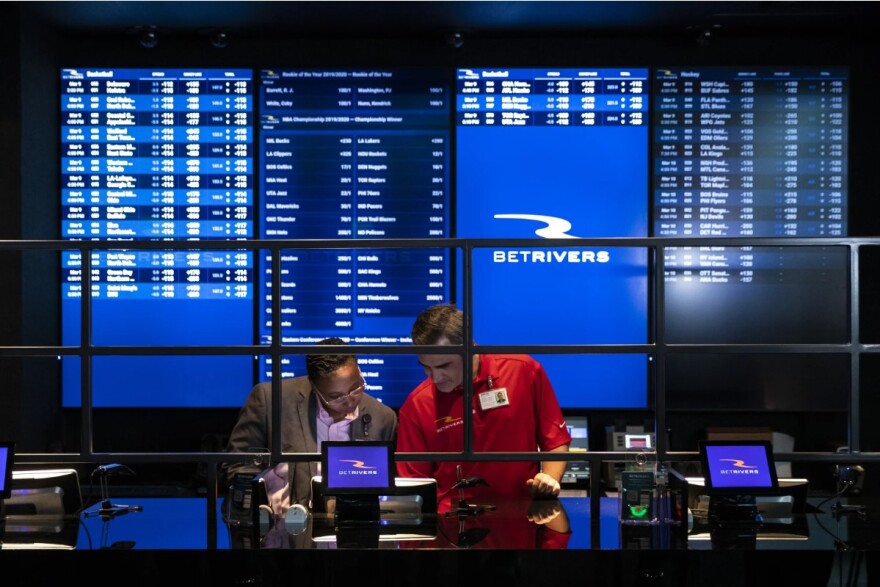As bets roll in on another season of March Madness, Gov. J.B. Pritzker is aiming to bust the tax bracket for Illinois sportsbooks and net the state a bigger piece of the action from a still-booming billion-dollar sports wagering market entering its fifth year.
Casino sportsbooks across Illinois have paid a 15% tax on their revenue after paying out winners since legal betting launched in 2020, but the Democratic governor’s latest budget proposal would increase that rate to 35%.
Pritzker’s office says the hike, which is still lower than other big-betting states, is a slam dunk to generate an extra $200 million for the cash-strapped state. Major gambling corporations argue it’ll block growth in a market that has ballooned into one of the biggest, most betting-hungry in the nation.
Illinois’ 11 active sportsbooks raked in just over $1 billion last year, sending $150 million in tax revenue to the state, according to Illinois Gaming Board records. The state’s take would’ve been $350 million under Pritzker’s proposed 35% rate.
The biggest books — FanDuel and DraftKings, which won nearly $410 million and $319 million, respectively, from Illinois gamblers in 2023 — claim the hike would be bad for bettors.
They joined other big-time oddsmakers to form the Sports Betting Alliance, whose spokesman Nathan Click said “Raising taxes on sports betting will allow illegal offshore sports operators to provide better odds and a competitive advantage over law-abiding sports books, crowd out smaller, startup and minority owned operators and their business partners, and threaten the long-term health and tax revenue generated by the legal market."
Pritzker spokesman Alex Gough said the higher tax simply would “ensure corporations are paying their fair share.”
“Since the legalization of sports betting in Illinois, gaming companies have enjoyed one of the lowest sports wagering taxes in the nation,” Gough said in an email. “In that time, the sports betting industry has exploded and companies like DraftKings and FanDuel have seen incredible profits.”
The revenue tax hike would still be “a far cry” from the 51% companies pay for wagers placed online in New York, the biggest betting state in the U.S., Pritzker’s office said. Pennsylvania operators pay a 36% rate. It's about 13% in New Jersey, 7% in Nevada and 20% in Ohio.
Ohio lawmakers doubled their tax rate earlier this year, and it “hasn’t been too much of a detriment,” according to Robert Linnehan, a regulatory writer for XLMedia who has covered the expansion of sports betting since a 2018 U.S. Supreme Court decision opened the floodgates to wagers beyond Nevada.
New Jersey lawmakers are mulling an increase, too, to 30%.
“States are still figuring this out as they go,” Linnehan said. “Lawmakers see money being left on the table in markets that are extraordinarily popular, and, at least so far, it’s still been worth it for operators, because people really, really want to bet.”
Opponents of the tax hike in the Sports Betting Alliance suggested Illinois lawmakers could generate more money by crossing the final frontier of legal gambling in a state already crawling with 15 casinos — by embracing i-gaming, which would bring casino games like roulette and blackjack to the palms of gamblers’ hands, another world of gambling that’s so far sanctioned in only a handful of states.
Lawmakers aren’t expected to consider i-gaming during the current legislative session in Springfield, as they have until the end of May to pass a budget for the upcoming fiscal year.
Pritzker pushed for sports betting as part of a massive gambling expansion passed in 2019 to help fund his $45 billion capital infrastructure improvement plan.
Illinois bettors have been more than willing to oblige, plunking down more than $31 billion in wagers since early March 2020, when former Blackhawks announcer Eddie Olczyk placed Illinois’ first legal wager at Rivers Casino in Des Plaines just days before the COVID-19 pandemic turned life upside down.

That would average out to more than $15,000 wagered in the state every minute in Illinois’ first four years of legal sports betting — shaking out to roughly $3,150 wagered by every adult resident.
The sportsbooks have come out on top to the tune of almost $2.6 billion through the end of January, the most recent month for which gaming board data is available. The state’s take has been about $387 million.
“Overall, it’s been hugely successful, and Illinois taxpayers are benefiting,” said former state Rep. Michael Zalewski, the Riverside Democrat who spearheaded Illinois’ sports betting law. “We’ve got passionate fan bases and a dense gaming market. Illinois should be at the top.”
Gambling addiction treatment providers have reported an uptick in people seeking help since sports betting became ubiquitous in Illinois and beyond. About 383,000 Illinoisans have a problem (not only with sports), and another 761,000 could be at risk, research has shown.
For more information or immediate help from licensed gambling addiction counselors, call 1-800-GAMBLER or text ILGAMB to 833234.

